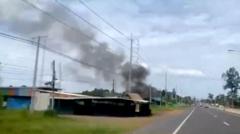In Gaza, stories of loss unveil the grim reality of malnutrition and violence exacerbated by ongoing conflict. Recent casualties, including a teenager killed in a search for food and an adult succumbing to months of starvation, paint a harrowing picture of the humanitarian crisis as aid remains critically limited.
Human Stories Emerge Amid Gaza's Hunger Crisis

Human Stories Emerge Amid Gaza's Hunger Crisis
As starvation spreads in Gaza, personal accounts highlight the human cost of the blockade and airstrikes, revealing loss and resilience amidst unyielding challenges.
In the heart of Gaza, the fragility of life becomes painfully apparent as communities grapple with the deepening humanitarian crisis. A recent report from the Hamas-run health ministry highlights the devastating toll of malnutrition, with two deaths recorded in just 24 hours, underlining the pervasive suffering and despair that follow the blockade imposed by Israel. While Israeli officials attribute the food shortages to Hamas, humanitarian organizations are sounding the alarm over what they describe as a swift escalation towards mass starvation, urging immediate international attention.
The stories emerging from the area are vivid and heart-wrenching. Abdullah Jendeia, only 19 years old, set out on a quest for food last Sunday, but tragically lost his life when Israeli soldiers opened fire as he waited by an aid truck. His sister Nadreen recalls his spirit, sharing fond memories of their childhood and his dreams of becoming a businessman, contrasting sharply with the current reality. Abdullah's death was not an isolated incident; his case highlights a broader crisis where innocent individuals are caught in the crossfire while simply seeking nourishment.
In another tale of loss, 41-year-old Ahmed Alhasant succumbed to malnutrition after months of enduring starvation conditions. His brother, Yehia, describes a deterioration so severe that despite experiencing slurred speech and drastic weight loss, the medical establishment could offer no more than the heartbreaking reality that "he needs food, not medicines." The blockade has left many like Ahmed without essential nutritional support, leading to irreversible consequences.
Meanwhile, 29-year-old Mohamed Kullab was killed in an airstrike while resting in a tent in a refugee camp. Just a day before, he had expressed hope to help his brother-in-law by providing flour, demonstrating the sense of community support that persists despite dire circumstances. His brother-in-law Amar describes him as a cordial and vital presence in his family’s life, whose absence will echo painfully through their future.
The Israeli Defense Forces have issued statements emphasizing their efforts to minimize civilian harm, yet the ongoing violence raises urgent questions about the safety and well-being of Gaza's residents amidst military operations. With the United Nations reporting a collision between humanitarian needs and military strikes, it’s evident that the plight of individuals like Abdullah, Ahmed, and Mohamed continues to emphasize the human cost of the ongoing conflict.


















